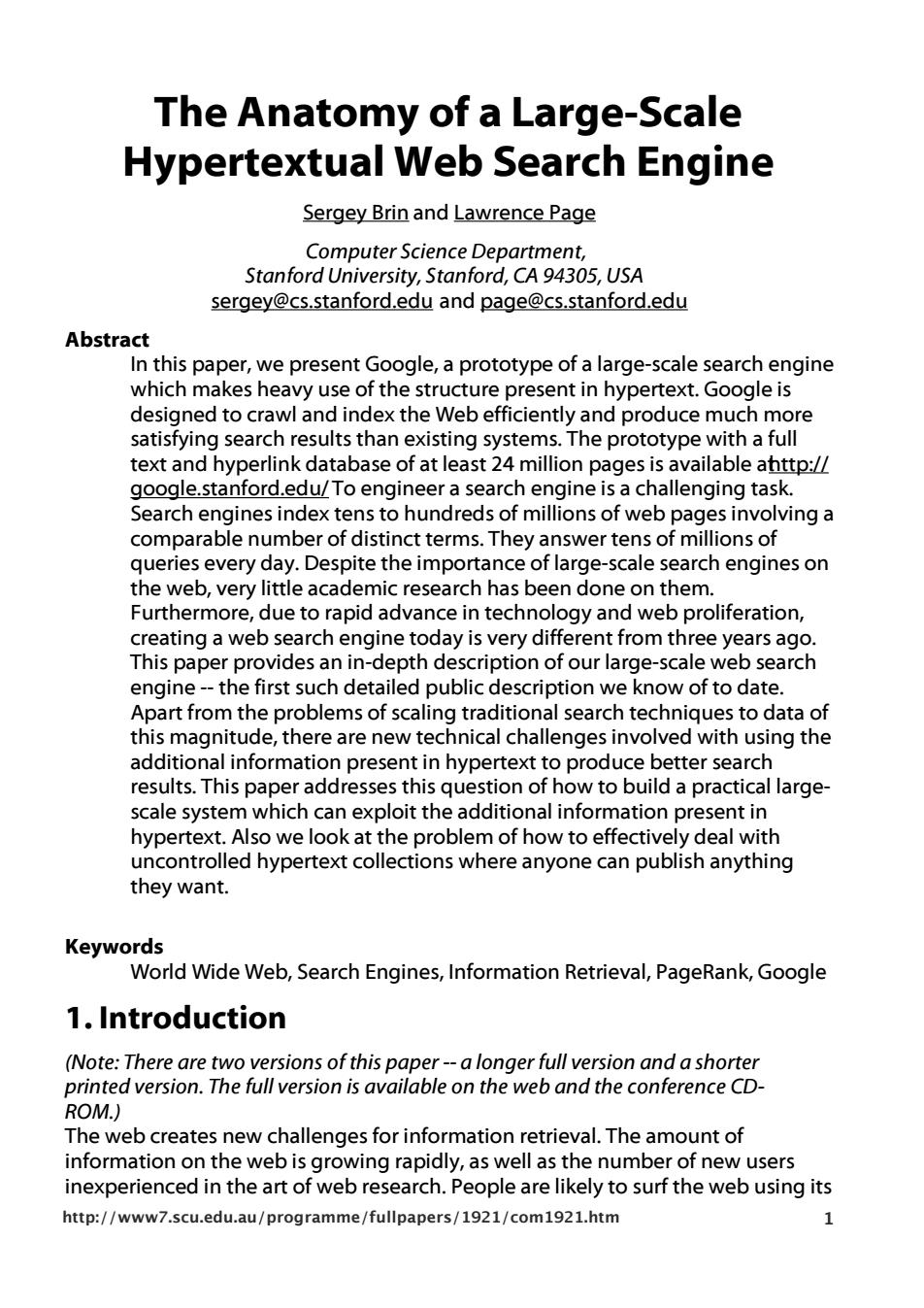正在加载图片...

The Anatomy of a Large-Scale Hypertextual Web Search Engine Sergey Brin and Lawrence Page Computer Science Department, Stanford University,Stanford,CA 94305,USA sergey@cs.stanford.edu and page@cs.stanford.edu Abstract In this paper,we present Google,a prototype of a large-scale search engine which makes heavy use of the structure present in hypertext.Google is designed to crawl and index the Web efficiently and produce much more satisfying search results than existing systems.The prototype with a full text and hyperlink database of at least 24 million pages is available ahttp:// google.stanford.edu/To engineer a search engine is a challenging task. Search engines index tens to hundreds of millions of web pages involving a comparable number of distinct terms.They answer tens of millions of queries every day.Despite the importance of large-scale search engines on the web,very little academic research has been done on them. Furthermore,due to rapid advance in technology and web proliferation, creating a web search engine today is very different from three years ago. This paper provides an in-depth description of our large-scale web search engine--the first such detailed public description we know of to date. Apart from the problems of scaling traditional search techniques to data of this magnitude,there are new technical challenges involved with using the additional information present in hypertext to produce better search results.This paper addresses this question of how to build a practical large- scale system which can exploit the additional information present in hypertext.Also we look at the problem of how to effectively deal with uncontrolled hypertext collections where anyone can publish anything they want. Keywords World Wide Web,Search Engines,Information Retrieval,PageRank,Google 1.Introduction (Note:There are two versions of this paper--a longer full version and a shorter printed version.The full version is available on the web and the conference CD- ROM.) The web creates new challenges for information retrieval.The amount of information on the web is growing rapidly,as well as the number of new users inexperienced in the art of web research.People are likely to surf the web using its http://www7.scu.edu.au/programme/fullpapers/1921/com1921.htm 1The Anatomy of a Large-Scale Hypertextual Web Search Engine Sergey Brin and Lawrence Page Computer Science Department, Stanford University, Stanford, CA 94305, USA sergey@cs.stanford.edu and page@cs.stanford.edu Abstract In this paper, we present Google, a prototype of a large-scale search engine which makes heavy use of the structure present in hypertext. Google is designed to crawl and index the Web efficiently and produce much more satisfying search results than existing systems. The prototype with a full text and hyperlink database of at least 24 million pages is available at http:// google.stanford.edu/ To engineer a search engine is a challenging task. Search engines index tens to hundreds of millions of web pages involving a comparable number of distinct terms. They answer tens of millions of queries every day. Despite the importance of large-scale search engines on the web, very little academic research has been done on them. Furthermore, due to rapid advance in technology and web proliferation, creating a web search engine today is very different from three years ago. This paper provides an in-depth description of our large-scale web search engine -- the first such detailed public description we know of to date. Apart from the problems of scaling traditional search techniques to data of this magnitude, there are new technical challenges involved with using the additional information present in hypertext to produce better search results. This paper addresses this question of how to build a practical largescale system which can exploit the additional information present in hypertext. Also we look at the problem of how to effectively deal with uncontrolled hypertext collections where anyone can publish anything they want. Keywords World Wide Web, Search Engines, Information Retrieval, PageRank, Google 1. Introduction (Note: There are two versions of this paper -- a longer full version and a shorter printed version. The full version is available on the web and the conference CDROM.) The web creates new challenges for information retrieval. The amount of information on the web is growing rapidly, as well as the number of new users inexperienced in the art of web research. People are likely to surf the web using its http://www7.scu.edu.au/programme/fullpapers/1921/com1921.htm link graph, often starting with high quality human maintained indices such as 1